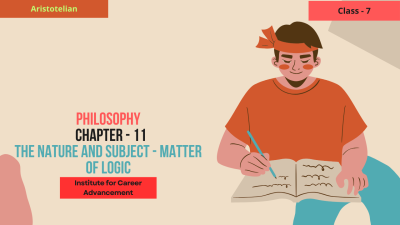| Short description |
Logic is the study of reasoning and argumentation. It's concerned with how we think, how we construct arguments, and how we can determine whether those arguments are valid or sound.
Key Aspects:
Formal vs. Informal Logic:
Formal Logic: Deals with the structure and form of arguments, focusing on the validity of inferences based on their logical form, regardless of the content.
Informal Logic: Concerned with the content and context of arguments, evaluating them for their strength, relevance, and persuasiveness in everyday language.
Core Concepts:
Propositions: Statements that can be either true or false.
Arguments: A set of propositions where one or more (premises) are intended to support another (conclusion).
Validity: A deductive argument is valid if its conclusion necessarily follows from its premises.
Soundness: A deductive argument is sound if it is both valid and its premises are true.
Laws of Thought:
Law of Identity: A thing is identical to itself (A is A).
Law of Non-Contradiction: A thing cannot be both A and not-A at the same time and in the same respect.
Law of Excluded Middle: A thing must either be A or not-A; there is no third option.
যুক্তি হল যুক্তি এবং যুক্তির অধ্যয়ন। আমরা কীভাবে চিন্তা করি, কীভাবে যুক্তি তৈরি করি এবং সেই যুক্তিগুলি বৈধ বা সঠিক কিনা তা আমরা কীভাবে নির্ধারণ করতে পারি তার সাথে এটি সম্পর্কিত। মূল দিকগুলিঃ আনুষ্ঠানিক বনাম। অনানুষ্ঠানিক যুক্তিঃ আনুষ্ঠানিক যুক্তিঃ বিষয়বস্তু নির্বিশেষে, তাদের যৌক্তিক রূপের উপর ভিত্তি করে অনুমানের বৈধতার উপর দৃষ্টি নিবদ্ধ করে আর্গুমেন্টের কাঠামো এবং ফর্মের সাথে ডিল করে। অনানুষ্ঠানিক যুক্তিঃ তর্কের বিষয়বস্তু এবং প্রসঙ্গের সাথে সম্পর্কিত, দৈনন্দিন ভাষায় তাদের শক্তি, প্রাসঙ্গিকতা এবং প্ররোচনার জন্য তাদের মূল্যায়ন করা। মূল ধারণাগুলিঃ প্রস্তাবনাঃ এমন বিবৃতি যা সত্য বা মিথ্যা হতে পারে। যুক্তিঃ প্রস্তাবের একটি সেট যেখানে এক বা একাধিক (প্রাঙ্গণ) অন্য (উপসংহার) সমর্থন করার উদ্দেশ্যে করা হয় বৈধতাঃ একটি অবরোহী যুক্তি বৈধ যদি তার উপসংহার অবশ্যই তার প্রাঙ্গণ থেকে অনুসরণ করে। দৃঢ়তা (সাউন্ডনেস): একটি অনুমানমূলক যুক্তি যদি বৈধ হয় এবং এর ভিত্তি উভয়ই সত্য হয়। চিন্তার নিয়মঃ পরিচয়ের আইনঃ একটি জিনিস নিজের সাথে অভিন্ন (এ হল এ) অ-দ্বন্দ্বের আইনঃ একটি জিনিস একই সময়ে এবং একই ক্ষেত্রে এ এবং না-এ উভয়ই হতে পারে না। বাদ দেওয়া মধ্যের আইনঃ একটি জিনিস অবশ্যই A বা না-A হতে হবে; কোনও তৃতীয় বিকল্প নেই। |
|
|
| Requirements |
- Studying the nature and subject matter of logic in Class 11 is crucial for several key reasons: Developing Critical Thinking Skills: Evaluating Information: Logic equips students with the tools to critically evaluate information, identify biases, and distinguish between valid and invalid arguments. Reasoned Decision-Making: It helps students develop the ability to make reasoned decisions and solve problems effectively. Identifying Fallacies: Studying logic helps students identify and avoid common logical fallacies, such as ad hominem attacks, straw man arguments, and false dilemmas. Improving Communication and Argumentation: Clear and Concise Expression: Logic helps students express their thoughts and ideas clearly, concisely, and persuasively. Constructing Sound Arguments: It teaches students how to construct sound arguments with strong evidence and logical reasoning. Effective Debate: Logic provides a framework for engaging in constructive debates and discussions. Academic Success: Foundation for Higher Learning: Logic is a fundamental skill for success in higher education, particularly in subjects like philosophy, mathematics, law, and computer science. Improved Academic Performance: Strong logical reasoning skills can significantly improve academic performance across various subjects. Real-World Applications: Everyday Life: Logic is a valuable tool in everyday life, helping us navigate complex situations, make informed decisions, and solve problems effectively. Citizenship: It empowers individuals to critically evaluate information, engage in civic discourse, and make informed decisions as citizens. By studying the nature and subject matter of logic, students gain a valuable set of skills that will benefit them throughout their academic and personal lives. It fosters critical thinking, enhances communication, and prepares them for the challenges of an increasingly complex world.
- একাদশ শ্রেণিতে যুক্তির প্রকৃতি এবং বিষয় অধ্যয়ন করা বেশ কয়েকটি মূল কারণে গুরুত্বপূর্ণঃ সমালোচনামূলক চিন্তাভাবনার দক্ষতা গড়ে তোলাঃ তথ্য মূল্যায়নঃ যুক্তি শিক্ষার্থীদের তথ্যের সমালোচনামূলক মূল্যায়ন, পক্ষপাত চিহ্নিত করা এবং বৈধ ও অবৈধ যুক্তির মধ্যে পার্থক্য করার সরঞ্জাম দিয়ে সজ্জিত করে। যুক্তিসঙ্গত সিদ্ধান্ত গ্রহণঃ এটি শিক্ষার্থীদের যুক্তিসঙ্গত সিদ্ধান্ত নেওয়ার এবং কার্যকরভাবে সমস্যা সমাধানের ক্ষমতা বিকাশে সহায়তা করে। ভুলগুলি সনাক্ত করাঃ যুক্তি অধ্যয়ন শিক্ষার্থীদের সাধারণ যৌক্তিক ভুলগুলি সনাক্ত করতে এবং এড়াতে সহায়তা করে, যেমন অ্যাড হোমিনম আক্রমণ, স্ট্র ম্যান আর্গুমেন্ট এবং মিথ্যা দ্বিধা। যোগাযোগ ও যুক্তির উন্নতিঃ স্পষ্ট এবং সংক্ষিপ্ত অভিব্যক্তিঃ যুক্তি শিক্ষার্থীদের তাদের চিন্তাভাবনা এবং ধারণাগুলি স্পষ্টভাবে, সংক্ষিপ্তভাবে এবং প্ররোচিতভাবে প্রকাশ করতে সহায়তা করে। সাউন্ড আর্গুমেন্ট তৈরি করাঃ এটি শিক্ষার্থীদের শক্তিশালী প্রমাণ এবং যৌক্তিক যুক্তি দিয়ে কীভাবে সাউন্ড আর্গুমেন্ট তৈরি করতে হয় তা শেখায়। কার্যকরী বিতর্কঃ যুক্তি গঠনমূলক বিতর্ক এবং আলোচনায় জড়িত হওয়ার জন্য একটি কাঠামো প্রদান করে। একাডেমিক সাফল্যঃ উচ্চ শিক্ষার জন্য ভিত্তিঃ উচ্চ শিক্ষায়, বিশেষ করে দর্শন, গণিত, আইন এবং কম্পিউটার বিজ্ঞানের মতো বিষয়ে সাফল্যের জন্য যুক্তি একটি মৌলিক দক্ষতা। উন্নত একাডেমিক পারফরম্যান্সঃ শক্তিশালী যৌক্তিক যুক্তি দক্ষতা বিভিন্ন বিষয়ে একাডেমিক পারফরম্যান্সকে উল্লেখযোগ্যভাবে উন্নত করতে পারে। রিয়েল-ওয়ার্ল্ড অ্যাপ্লিকেশনঃ দৈনন্দিন জীবনঃ দৈনন্দিন জীবনে যুক্তি একটি মূল্যবান হাতিয়ার, যা আমাদের জটিল পরিস্থিতিগুলি পরিচালনা করতে, অবহিত সিদ্ধান্ত নিতে এবং কার্যকরভাবে সমস্যাগুলি সমাধান করতে সহায়তা করে। নাগরিকত্বঃ এটি ব্যক্তিদের তথ্যের সমালোচনামূলক মূল্যায়ন, নাগরিক আলোচনায় জড়িত হওয়া এবং নাগরিক হিসাবে অবহিত সিদ্ধান্ত নেওয়ার ক্ষমতা দেয়। যুক্তির প্রকৃতি এবং বিষয় অধ্যয়ন করে, শিক্ষার্থীরা একটি মূল্যবান দক্ষতা অর্জন করে যা তাদের একাডেমিক এবং ব্যক্তিগত জীবন জুড়ে তাদের উপকৃত করবে। এটি সমালোচনামূলক চিন্তাভাবনাকে উৎসাহিত করে, যোগাযোগ বাড়ায় এবং ক্রমবর্ধমান জটিল বিশ্বের চ্যালেঞ্জগুলির জন্য তাদের প্রস্তুত করে।
|
|
|


 0
0 